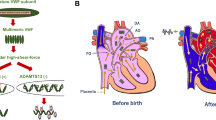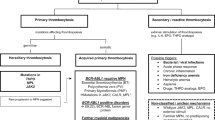Abstract
Antiphospholipid antibody syndrome (APS) is an acquired thrombophilia with multisystem involvement. This study was undertaken to study the antibody profile of pregnant women with APS and their pregnancy outcomes. This retrospective study was conducted in a tertiary care teaching institute in Southern India. Data of 231 APS-positive pregnancies in 104 women were analyzed in this study. The primary outcome was to study the adverse outcomes such as abortions, intrauterine fetal death, neonatal death, maternal thrombotic events, and preeclampsia in APS-complicated pregnancies. Secondary outcomes were to study the adverse clinical outcomes in comparison to various antiphospholipid antibodies; primary versus secondary APS; and obstetric versus thrombotic APS. Anticardiolipin antibody (ACLA) (n = 157, 68%) was the most common antibody identified followed by lupus anticoagulant (LA) (n = 80, 34.6%) and beta-2-glycoprotein (B2GP) (n = 48, 20.8%). B2GP positivity was associated with higher fetal growth restriction (FGR) (66.7% vs 36.3% vs 32.6%, p value 0.05) and stillbirth (30% vs 9.5% vs 13%, p 0.004) in comparison to ACLA and LA. Multiple antibody positivity was associated with a significantly higher first trimester losses (55.2% first trimester loss in double positive versus 43.2% in single antibody positive group; p 0.004). Thrombotic APS was associated with higher rates of intrauterine growth–restricted fetuses than obstetric APS (35.2% vs 55.9%, p 0.032). ACLA is the most common antibody identified in the APS-positive pregnancies in Southern Indian population. The adverse pregnancy outcomes were higher in multiple antibody positivity and B2GP group.
Similar content being viewed by others
Data Availability
Yes, available.
Code Availability
Not applicable.
Abbreviations
- APS:
-
Antiphospholipid antibody syndrome
- ACLA:
-
Anticardiolipin antibody
- B2GP:
-
Beta-2-glycoprotein
- LA:
-
Lupus anticoagulant
- SLE:
-
Systemic lupus erythematosus
- FGR:
-
Fetal growth retardation
- IUFD:
-
Intrauterine fetal death
- UFH:
-
Unfractionated heparin
- LMWH:
-
Low molecular weight heparin
- HCQ:
-
Hydroxychloroquine
References
Miyakis S, Lockshin MD, Atsumi T, Branch DW, Brey RL, Cervera R, et al. International consensus statement on an update of the classification criteria for definite antiphospholipid syndrome (APS). J Thromb Haemost. 2006;4(2):295–306.
Katz VL. Spontaneous and recurrent abortion: etiology, diagnosis, treatment. In: Katz VL, Lentz GM, Lobo RA, Gershenson DM, editors. Comprehensive Gynecology. 6th ed. Philadelphia (PA): Elsevier Mosby; 2012. p. 335–59.
Sharma D, Shastri S, Farah bakhsh N, Sharma P. Intrauterine growth restriction–part 1. J Matern Fetal Neonatal Med. 2016;7:1–11.
World Health Organization. Neonatal and perinatal mortality: country, regional and global estimates. World Health Organization; 2006.
Brown MA, Magee LA, Kenny LC, et al. Hypertensive disorders of pregnancy: ISSHP classification, diagnosis, and management recommendations for international practice. Hypertension. 2018;72:24.
de Jesús, G.R.; Benson, A.E.; Chighizola, C.B.; Sciascia, S.; Branch, D.W. Sixteenth international congress on antiphospholipid antibodies task force. Report on obstetric antiphospholipid syndrome. Lupus 2020.
Cervera R, Serrano R, Pons-Estel GJ, Ceberio-Hualde L, Shoenfeld Y, De Ramón E, et al. Morbidity and mortality in the antiphospholipid syndrome during a 10-year period: a multicentre prospective study of 1000 patients. Annals of the rheumatic diseases. 2015;74(6):1011–8.
Perches PG, Domingues DP, Gomes AL, Ribeiro AM, Pereira FMT, Rassi IE, et al. Evaluation of antiphospholipid antibodies testing for the diagnosis of antiphospholipid syndrome. Rev Bras Reumatol. 2009;114:553–8.
Kutteh WH, Hinote CD. Antiphospholipid antibody syndrome. Obstet Gynecol Clin North Am. 2014;41(1):113–32.
Fredi M, Andreoli L, Aggogeri E, et al. Risk factors for adverse maternal and fetal outcomes in women with confirmed APL positivity: results from a multicenter study of 283 pregnancies. Front Immunol. 2018;7(9):864.
Alijotas-Reig J, Ferrer-Oliveras R, Ruffatti A, Tincani A, Lefkou E, Bertero MT, et al. The European Registry on Obstetric Antiphospholipid Syndrome (EUROAPS): a survey of 247 consecutive cases. Autoimmun Rev. 2015;14(5):387–95. https://doi.org/10.1016/j.autrev.2014.12.01012.
Saccone G, Berghella V, Maruotti GM, Ghi T, Rizzo G, Simonazzi G, et al. Antiphospholipid antibody profile based obstetric outcomes of primary antiphospholipid syndrome: the PREGNANTS study. Am J Obstet Gynecol. 2017;216:e1-525. https://doi.org/10.1016/j.ajog.2017.01.026.
Branch DW, Holmgren C, Goldberg JD. Committee on practice bulletins- Obstetrics Practice bulletin no 132: antiphospholipid antibody syndrome. Obstet Gynaecol. 2012;120:1514–21.
Myers B, Pavord S. Diagnosis and management of antiphospholipid syndrome in pregnancy. Obstet Gynaecol. 2011;13:15–21.
Empson M, Lassere M, Craig J, Scott J. Prevention of recurrent miscarriage for women with antiphospholipid antibody or lupus anticoagulant. Cochrane Database Syst Rev. 2005, Apr 18.
Ziakas PD, Pavlou M, Voulgarelis M. Heparin treatment in antiphospholipid syndrome with recurrent pregnancy loss: a systematic review and meta-analysis. Obstetrics & Gynecology. 2010;115(6):1256–62.
Smyth A, Oliveira GH, Lahr BD, et al. A systematic review and meta-analysis of pregnancy outcomes in patients with systemic lupus erythematosus and lupus nephritis. Clin J Am Soc Nephrol. 2010;5:2060–8.
Danowski A, de Azevedo MN, de Souza Papi JA, Petri M. Determinants of risk for venous and arterial thrombosis in primary antiphospholipid syndrome and in antiphospholipid syndrome with systemic lupus erythematosus. J Rheumatol. 2009;36(6):1195–9.
Mak A, Cheung MW, Cheak AA, Ho RC. Combination of heparin and aspirin is superior to aspirin alone in enhancing live births in patients with recurrent pregnancy loss and positive anti-phospholipid antibodies: a meta-analysis of randomized controlled trials and meta-regression. Rheumatology (Oxford). 2010;49(2):281–8.
Tektonidou MG, Andreoli L, Limper M, et al. EULAR recommendations for the management of antiphospholipid syndrome in adults. Ann Rheum Dis. 2019;78(10):1296–304.
Mekinian A, Costedoat-Chalumeau N, Masseau A, et al. Obstetrical APS is there a place for hydroxychloroquine to improve the pregnancy outcome. Autoimmun Rev. 2015;14(1):23-29 74.
Hunt BJ. A novel antiphospholipid antibody agent? Blood. 2010;115(11):2124–5.
Author information
Authors and Affiliations
Contributions
Guarantor: YS.
Contributorship: YS, MS, and CKG conceived the idea and performed the search. YS and MS collected the records. RM performed the statistical analysis. YS, MS, and CKG wrote the draft. All authors contributed to revising and finalization of the manuscript.
Corresponding author
Ethics declarations
Conflict of Interest
The authors declare no competing interests.
Ethics Approval
The study was approved by the Institute Ethics Committee (Human Studies) of Jawaharlal Institute of Postgraduate Medical Education and Research with the approval ID: JIP/IEC/2020/272.
Consent to Participate
Not applicable.
Consent for Publication
Not applicable.
Additional information
Publisher's Note
Springer Nature remains neutral with regard to jurisdictional claims in published maps and institutional affiliations.
Rights and permissions
Springer Nature or its licensor (e.g. a society or other partner) holds exclusive rights to this article under a publishing agreement with the author(s) or other rightsholder(s); author self-archiving of the accepted manuscript version of this article is solely governed by the terms of such publishing agreement and applicable law.
About this article
Cite this article
Venkatesh, Y.S., Subbaiah, M., Kavadichanda, C. et al. Pregnancy and Clinical Outcome Among Women with Antiphospholipid Antibody Syndrome—A Tertiary Care Center–Based Observational Study. SN Compr. Clin. Med. 6, 14 (2024). https://doi.org/10.1007/s42399-024-01643-z
Accepted:
Published:
DOI: https://doi.org/10.1007/s42399-024-01643-z




